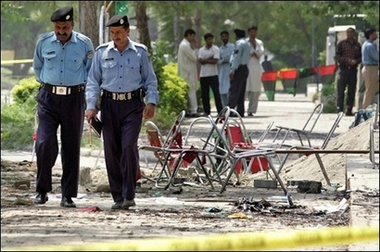Pakistan's Musharraf vows war on militants
(AFP)Updated: 2007-07-19 02:01 President Pervez Musharraf said Wednesday Pakistan was in open battle with Islamic militants who have launched a spate of suicide attacks, but he ruled out declaring a state of emergency.
 Pakistani policemen inspect the bomb blast site in Islamabad. President Pervez Musharraf said Pakistan was in open battle with Islamic militants who have launched a spate of suicide attacks, but ruled out declaring a state of emergency.[AFP]  |
Musharraf's tough stance came after 34 troops and militants died in gunbattles in a rugged tribal area bordering Afghanistan, a day after a suicide blast at an anti-government rally in Islamabad killed 17.
"We are in direct confrontation with extremist forces. It is moderates versus extremists," Musharraf was quoted as saying by a top government official who attended a meeting between the president and local media.
Pakistan's military ruler, who is under intense US pressure to crack down on Islamic extremism, pledged to tackle those responsible for the upsurge in violence since government troops raided Islamabad's Red Mosque last week.
"We have to attack the source where suicide bombers are sprouting. We have a fair idea of who is behind that... we must attack those who sponsor them," he said.
However Musharraf, who seized power in a 1999 coup, pledged that "there will be no emergency" despite the bloodshed, adding that violence will not derail elections to be held early next year at the latest.
The United States has sharply ramped up the pressure on its regional ally to launch a full military offensive in northwestern frontier areas where it says insurgents are hiding out and plotting new 9/11 style attacks.
A US intelligence report warned on Tuesday that Al-Qaeda has regrouped in its Pakistani "safe haven" in the tribal belt and is determined to inflict mass casualties through new attacks on the United States.
But Pakistan foreign office spokeswoman Tasnim Aslam said the US report contained "some unsubstantiated assertions".
"We would firmly act to eliminate any Al-Qaeda hideout on the basis of specific intelligence or information," she added.
Musharraf said a force of 30,000 security personnel -- half police and half paramilitary soldiers -- would be drawn up by the end of the year to confront extremists in the tribal region.
Pakistan has been ravaged by bloody attacks since government troops stormed the hardline Red Mosque in the capital last week, killing scores of militants and fuelling mass protests and calls for holy war against Musharraf.
Seventeen troops and at least the same number of rebels were killed in fighting on Wednesday after two separate insurgent ambushes in the North Waziristan tribal zone, the army said.
Pro-Taliban militants in the area scrapped a 10-month peace accord with the government on Sunday. Two dozen tribal elders held new talks with authorities in the northwestern city of Peshawar Wednesday in a bid to save the deal.
Meanwhile investigators probing Tuesday's blast at a rally in Islamabad for the country's suspended chief justice, Iftikhar Muhammad Chaudhry, said they found parts of a mutilated head believed to belong to the suicide bomber.
The death toll rose to 17 overnight after two people died in hospital, interior ministry spokesman Brigadier Javed Cheema said.
Speculation has swirled over who was behind the Islamabad killings.
Intelligence officials said they had intercepted telephone calls during the siege of the Red Mosque between its rebel cleric Abdul Rashid Ghazi and a top Pakistani Taliban leader in the tribal belt, Baitullah Mahsud.
Mahsud, who was blamed for orchestrating a string of suicide attacks earlier this year, told Ghazi that "if he is killed his blood will not be wasted", the officials said. Ghazi was shot dead in the raid on the mosque on July 10.
Exiled former premier Benazir Bhutto -- said to be seeking an alliance with Musharraf -- agreed the blast was likely a militant backlash as it mainly hit workers from her secular Pakistan People's Party.
But many of the hundreds of lawyers at the event saw the hand of Pakistan's shadowy intelligence services in the attack.
Musharraf suspended Chaudhry on March 9 on abuse of power charges, but Chaudhry's supporters say he was ousted because he could have threatened the president's continued grip on power.
The Supreme Court is expected to rule on the case this week.
|
|
|
||
|
||
|
|